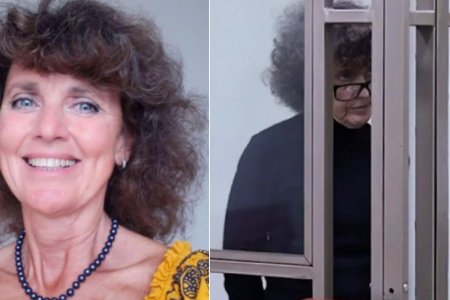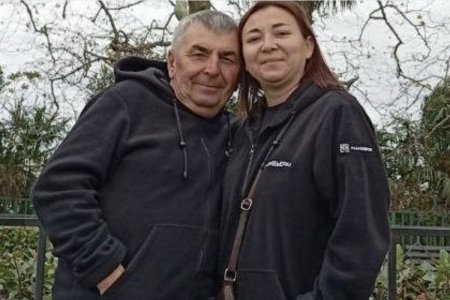
An illegal ‘court’ in Russian-occupied Crimea has sentenced 58-year-old Oksana Senedzhuk to 15 years’ imprisonment on supposed ‘treason’ charges, almost certainly linked with her pro-Ukrainian position and open criticism of Russia’s full-scale invasion of Ukraine.
Senedzhuk is described by Russia’s prosecutor as the chief specialist of the occupation ‘Sevastopol scientific research and planning institute of urban design, architecture, surveys and environment’. From 2006 to Russia’s invasion of Crimea she worked in the Sevastopol municipal administration and the Crimean Human Rights Group [CHRG] calls her a civic activist who actively supported and took part in the Euromaidan protests in late 2013 to early 2014
Senedzhuk’s family have told CHRG that the occupation regime began persecuting her back in 2022 because of her openly pro-Ukrainian position and expressed opposition to Russia’s aggression. She was interrogated on many occasions before the FSB carried out a search of her home and seized her on 14 August 2024. She has been imprisoned ever since.
This was a fast-track and secretive ‘trial’, with a maximum of three ‘hearings’, all held behind closed doors, and before one ‘judge’ Igor Vladimirovych Kozhevnikov from the occupation ‘Sevastopol municipal court’ On 26 December 2024, he sentenced Oksana Senedzhuk to 15 years in a medium-security prison colony, to be followed by a further one year period of restricted liberty. A 200 thousand rouble fine was also imposed.

Senedzhuk was charged under Article 275 of Russia’s criminal code, with Russia having first made it impossible for Ukrainians living in Ukrainian Crimea to live and work without taking Russian citizenship, and then using such citizenship as excuse for accusing Ukrainians of ‘state treason’ with respect to the aggressor state.
it was claimed that Senedzhuk had been ‘recruited’ by an agent of Ukraine’s Security Service [SBU], and that, from 2008 to 2014 she had worked at the Sevastopol City Administration and the alleged ‘agent’ – at the Nakhimovsky District Administration. The man had, in 2015, moved to mainland Ukraine, but had maintained relations with Senedzhuk. It was purportedly on his instructions, in March 2023, that Senedzhuk had “carried out surveillance, taking photos and passed to Ukraine’s Intelligence information about the deployment of Russian Black fleet boats”.
There is every reason to be sceptical about the charges which, to a large extent, seem to be copy-pasted from one indictment to another. It is hard to imagine what information from photos or ‘surveillance’ that any Sevastopol resident could have provided that Ukraine’s Military Intelligence would not have already known.
There has also been a suspiciously sharp increase in the number of such sentences since Russia’s full-scale invasion of Ukraine, with the number set to increase even further following amendments passed recently broadening the scope of Article 275 to cover those without Russian citizenship. A large percentage of such cases, as well as the analogous ‘spying’ charges (under Article 276) until now used against those without Russian citizenship, are against Ukrainians, or Russians openly condemning Russia’s war of aggression against Ukraine.
All of these ‘treason’ and ‘spying’ cases are a favourite with Russia’s FSB, as the ‘trials’ are held behind closed doors, with even the name of the defendant’s lawyer kept secret. Such secrecy makes it impossible to ascertain what, if any, grounds the occupation regime had for such accusations. The charges and such ‘trials’ are, it should be stressed, illegal in any case as Russia, as an occupying state, is prohibited by international law from applying its legislation on occupied territory. There is no information as to whether Senedzhuk had an independent lawyer or only the individual provided by the aggressor state, who typically concentrates on persuading the defendant to admit to the charges. Several ‘lawyers’ provided by the prosecution in occupied Crimea have watched on, without comment, when the person they should have been defending was subjected to torture.
Major Ukrainian human rights NGOs, including the Crimean Human Rights Group and Helsinki Human Rights Union, issued a statement on 27 December, condemning the politically motivated persecution of Oksana Senedzhuk, and demanding her release. Since Russia can be expected to ignore such demands, they call on other governments and international organizations to demand that Russia free Oksana Senedzhuk and to bring personal sanctions against those Russian citizens involved in her persecution.
Oksana is by no means Russia’s only victim, and the NGOs call on countries and international bodies to increase diplomatic forms of pressure, sanctions, etc. on Russia to prevent such flagrant violations of human rights against Ukrainian nationals on occupied territory.



